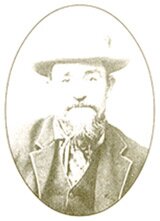
1889 - 1902
1939 - 1945
1935
1960
Sharpeville
Klip Power Station
William Stow
Coal
Vaal Dam
Vereeniging Estates
Peace Negotiations
Viljoensdrift
Vaal Triangle History
ereeniging Estates' ambitious farming schemes at Maccauvlei continued with the
re-introduction of sheep, which had been the mainstay of Pistorius's farming operations, when a herd of 5 000 was purchased from Christiaan de Wet, who distinguished himself as a general in the Anglo-Boer war.Curiously another young Afrikaner who became equally famous as a Boer general was also involved in the area. Coal mining operations had been expanded as the demand in Kimberley increased, but the plan to float the coal down the Vaal River was abandoned as impractical. An iron boat called the "Cecil Rhodes" was built for the purpose but literally and figuratively never got off the ground! Instead the coal was transported on ox wagon trains by transport riders, one of whom was the enterprising young Koos de la Rey.
The fluctuating fortunes of Maccauvlei during these early years illustrated Sammy Marks's amazing entrepreneurial flair, and it is largely due to him that the Vaal Triangle became South Africa's premier industrial area. In 1882, the costs of mining and transporting coal to Kimberley rose to the point where it became uneconomical and the colliery was temporarily closed. Marks transferred his attentions to a Pretoria project to build a distillery to produce gin. Despite some doubts about the quality in the early stages, Marks was quite correct in his belief that there would be a big demand for the product. Indeed it proved so popular that at one stage Marks seriously considered banning the use of his alcohol by his own mine workers because of the productivity problems it caused.
The coal mining slump was short-lived however, as gold mining activities on the Rand soon revived the fortunes of Maccauvlei. It also prompted the revival of Marks's plans to establish a township in the area where a herd of a few hundred springbok roamed. Hunting was seldom allowed and then only for very important visitors. One of these was Lord Randolph Churchill, father of the future British prime minister.
The establishment of Vereeniging Estates occurred after a difference of opinion between Marks and Lewis over the floating of their company on the stock exchange. Lewis won the day and in 1897 the South African and Orange Free State Coal and Mineral Mining Association was listed as Vereeniging Estates Limited.
Not content with diamonds, gold, coal and his distillery, Sammy Marks also investigated the possibility of establishing an iron works at Vereeniging. The idea was prompted by the costs and problems associated with hauling coal to Kimberley by ox wagon. He knew there was an iron ore deposit nearby and, with coal and water, hoped to produce the rails to build a line to Kimberley. He had a detailed study made of the requirements and costs. His partners were not so enthusiastic however, and very little progress was made with the project.
However, Marks was vindicated in 1910 when the Transvaal Administration invited tenders for the purchase of 15 000 tons of scrap iron lying at various railway workshops at £1 per ton, on condition that the tenderer set up a plant to convert the scrap into steel. The contract was awarded to a syndicate headed
The establishment of Vereeniging Estates occurred after a difference of opinion between Marks and Lewis over the floating of their company on the stock exchange. Lewis won the day and in 1897 the South African and Orange Free State Coal and Mineral Mining Association was listed as Vereeniging Estates Limited.
Not content with diamonds, gold, coal and his distillery, Sammy Marks also investigated the possibility of establishing an iron works at Vereeniging. The idea was prompted by the costs and problems associated with hauling coal to Kimberley by ox wagon. He knew there was an iron ore deposit nearby and, with coal and water, hoped to produce the rails to build a line to Kimberley. He had a detailed study made of the requirements and costs. His partners were not so enthusiastic however, and very little progress was made with the project.
However, Marks was vindicated in 1910 when the Transvaal Administration invited tenders for the purchase of 15 000 tons of scrap iron lying at various railway workshops at £1 per ton, on condition that the tenderer set up a plant to convert the scrap into steel. The contract was awarded to a syndicate headed


V
General Koos de la Rey
General Christiaan de Wet
From Gin Stills to Steel Mills
Page 5

